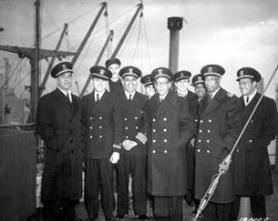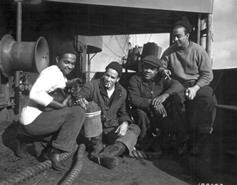Halifax Media Co-op
News from Nova Scotia's Grassroots
Halifax
Civil Rights on the High Seas
Civil Rights on the High Seas: the National Maritime Union and US Racial Politics in the Global Arena from World War to Cold War
7:30pm
- 9:00pm
Tuesday January 21 2014
Founded in 1937 amid the labor upsurge of the Great Depression, the National Maritime Union quickly became a site of struggle for the mid-twentieth-century Black freedom movement. Able to attract white members through its willingness to press ship owners for better wages and conditions, and able to attract Black members through its willingness to press whites for greater racial equality, the NMU and the ships it staffed provided a setting that fostered a critical analytical framework in which to place the racism that was a daily reality for all African Americans. Once onboard, NMU members were party to conversations among radical sailors, Black and white, about such topics as imperialism, the international dimensions of the contest between labor and capital, and the relationship between economic exploitation and racial oppression. The NMU was also one of the few high-profile organizations of the period that promoted Black members up through its ranks. During World War II, when the NMU played such a pivotal role in convoys that carried the materiel needed to combat fascism, the union had considerable leverage to carry out its political agenda.

The shift from world war to cold war brought about a transformation in global politics, one that dramatically redirected the role of this union in the struggle against white supremacy. The postwar retreat of antifascism and the advance of anticommunism in the United States gave rise to a debate within the NMU about its political direction: would it continue to push for a class based victory over racial capitalism at home and abroad, or would it jettison its internationalist agenda in favor of professions of loyalty to the US social order that was more in keeping with the increasingly conservative tenor of the cold war? The union’s left wing ultimately lost this debate, and by the 1950s the NMU withdrew from the political causes for which it had become well known during its first decade of existence. Nonetheless, the union trained an important cadre of intellectuals and activists who would continue to influence the Black freedom struggle for decades.

John Munro completed his PhD in 2009 at the University of California, Santa Barbara with a dissertation entitled “The Anticolonial Front: Cold War Imperialism and the Struggle Against Global White Supremacy, 1945-1960.” His articles have appeared in Labour/Le Travail, the Globality Studies Journal, and the Canadian Review of American Studies. In September 2011 he joined the history department as an assistant professor at Saint Mary’s University, where he teaches classes on US history, the cold war, and decolonization.
This presentation will be followed by a comment by Phanuel Antwi, English Department, St. Mary’s University and is sponsored by the University’s new created Centre for Interdisciplinary Study of Culture.
Phanuel Antwi is an assistant professor of literatures and cultures of the Black Atlantic in the department of English at St. Mary’s University. His research and teaching interests include Canadian literature and culture, material culture, black Atlantic studies, community-based cultural production, and critical race and gender studies. His articles have appeared in Studies in Canadian Literature, Affinities: A Journal of Radical Theory, Culture, and Action, and PRECIPICe: A Literary Journal. He is also a coeditor of the special issue on the theme of “Postcolonial Intimacies” for Intervention: International Journal of Postcolonial Studies.
For additional information:
Richard MacMichael
902-424-8897
macmicrs@gov.ns.ca
The site for the Halifax local of The Media Co-op has been archived and will no longer be updated. Please visit the main Media Co-op website to learn more about the organization.


